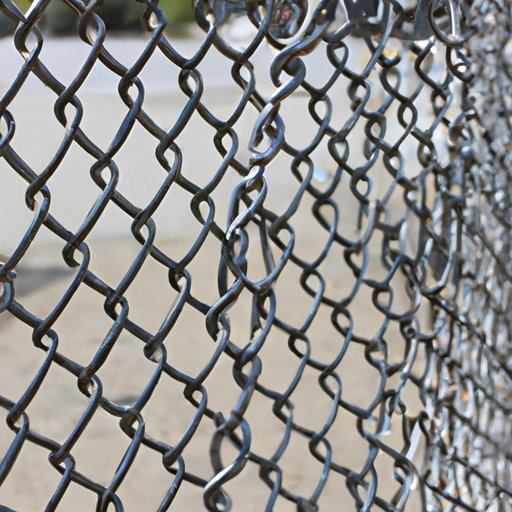Introduction
A chain link fence is a type of fencing typically made from galvanized or vinyl-coated steel wire woven together in a diamond pattern. It’s a popular choice for both residential and commercial properties due to its low cost and durability. But how much does a chain link fence cost? That depends on a variety of factors, including material type, size, location, height, gates, and labor costs.

Comparing Chain Link Fence Prices by Material Type and Size
Chain link fences come in three main types: galvanized steel, aluminum, and vinyl coated. The material type you choose will affect the price of your fence. Galvanized steel chain link fencing is the most common and least expensive option, with prices ranging from $8 to $14 per linear foot. Aluminum chain link fencing is slightly more expensive, with prices ranging from $12 to $18 per linear foot. And vinyl coated chain link fencing is the most expensive option, with prices ranging from $15 to $30 per linear foot.
In addition to material type, the size of your fence will also affect the price. Generally, the larger the fence, the higher the cost. For example, a 200-foot long fence will cost more than a 50-foot fence. This is because larger fences require more materials and labor to install.

Exploring the Different Factors that Impact Chain Link Fence Cost
Location is one of the biggest factors that affects the cost of a chain link fence. Installing a fence in a rural area will likely be cheaper than installing a fence in an urban area due to the availability of contractors and materials. Additionally, the height of the fence can impact the cost. A 4-foot tall fence will be less expensive than a 6-foot tall fence.
Gates can also increase the cost of a chain link fence. Depending on the size and type of gate, prices can range from $200 to $1,000. Finally, labor costs can have a significant impact on the total cost of a chain link fence. Professional installation can cost anywhere from $10 to $20 per linear foot, depending on the complexity of the job.
How to Get the Best Price on a Chain Link Fence
Shopping around is one of the best ways to get the best price on a chain link fence. Compare prices from different suppliers to find the best deal. Additionally, asking for discounts can help you save money. Many suppliers offer discounts for bulk orders or for cash payments. Finally, doing some of the work yourself can help lower the cost of installation. If you’re comfortable working with tools, you may be able to handle some of the simpler tasks like measuring and cutting.
Calculating the Total Cost of Installing a Chain Link Fence
Once you’ve decided on a material type and size for your chain link fence, it’s time to estimate the cost of materials and labor. To estimate the cost of materials, multiply the length of the fence (in feet) by the cost per linear foot. For example, if you’re installing a 200-foot fence at $13 per linear foot, the material cost would be $2,600. To estimate labor costs, multiply the length of the fence (in feet) by the cost per linear foot. For example, if you’re paying $15 per linear foot for labor, the labor cost for a 200-foot fence would be $3,000. Add these two numbers together to calculate the total cost of installing the fence.
What to Consider When Budgeting for a Chain Link Fence
When budgeting for a chain link fence, it’s important to consider the quality of the materials you’re using. Cheaper materials may seem appealing, but they may not stand up to wear and tear as well as higher-quality materials. Additionally, it’s important to factor in the cost of long-term maintenance. Chain link fences need to be inspected and maintained regularly to ensure they remain secure and in good condition. Finally, it’s important to consider the resale value of the fence. Higher-quality materials may cost more upfront, but they can add value to your home should you decide to sell.

Pros and Cons of Different Chain Link Fence Materials
Galvanized steel is the most common and affordable material used for chain link fences. It’s strong and durable, and it doesn’t require much maintenance. However, it can rust over time, so it’s important to inspect the fence regularly. Aluminum is a lightweight and rust-resistant option, but it can be more expensive than steel. Vinyl coated chain link fences are the most expensive option, but they are also the most durable and require the least amount of maintenance.

Alternatives to Chain Link Fences for Your Property
If you’re looking for an alternative to a chain link fence, there are several options available. Wood fences are a popular choice for residential properties due to their aesthetic appeal. Wrought iron fences are also a popular option, although they can be expensive. Vinyl fences are another option, and they are relatively inexpensive and low-maintenance.
Conclusion
Chain link fences are an affordable and secure way to protect your property. The total cost of a chain link fence depends on a variety of factors, including material type, size, location, height, gates, and labor costs. Shopping around, asking for discounts, and doing some of the work yourself can help you get the best price on a chain link fence. Alternatives to chain link fencing, such as wood, wrought iron, and vinyl fences, are also available.
(Note: Is this article not meeting your expectations? Do you have knowledge or insights to share? Unlock new opportunities and expand your reach by joining our authors team. Click Registration to join us and share your expertise with our readers.)
